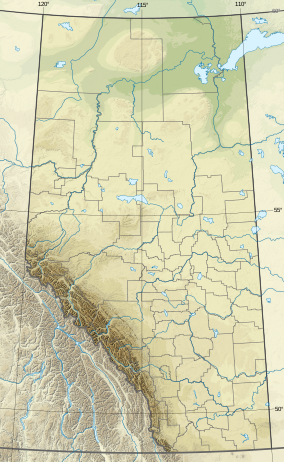Fidler-Greywillow Wildland Provincial Park
| Fidler-Greywillow Wildland Park | |
|---|---|
| Fidler-Greywillow Wildland Provincial Park | |
| Location | Regional Municipality of Wood Buffalo, Alberta, Canada |
| Nearest city | Fort Chipewyan |
| Coordinates | 58°56′11″N 110°37′8″W / 58.93639°N 110.61889°W |
| Area | 6,520.625 hectares (16,112.82 acres) |
| Created | March 1998 |
| Operator | Alberta Parks |
| Fidler-Greywillow Wildland Park | |
Fidler-Greywillow Wildland Park is a provincial park located in northeastern Alberta, Canada within the Regional Municipality of Wood Buffalo.[1] Summer activities include activities like back-country camping, hunting, kayaking, and fishing, and Winters offer Snowmobiling.[2] Random backcountry camping is allowed on Bustard Island.
Geography
The Fidler-Greywillow Wildland Park lies within the natural regions of the Canadian Shield - Kazan Uplands, and the Boreal Forest - Athabasca Plain.[2]
The park starts at an unnamed creek along the northwest shore of Lake Athabasca to Fidler Point. It also encompasses several islands in the lake; These include Bustard Island,[3] Burntwood Island,[4] and the Lucas Islands[5] To the southeast of Burntwood Island is Egg Island a small island part of the Egg Island Ecological Reserve.
Flora
Forbs specimens included; Drosera anglica (Oblong-leaved sundew), Menyanthes trifoliata (Buck-bean), Triglochin maritima (Side arrow grass).[6] Graminoids specimens included; Carex chordorrhiza (Prostrate sedge), Carex lasiocarpa (Woollyfruit sedge), Carex limosa (mud sedge), Carex rostrata (Beaked sedge), Juncus stygius (Marsh rush), Scheuchzeria palustris (Scheuchzeria).[6] Bryophytes specimens included; Sphagnum angustifolium (fine peat/bogmoss), Warnstorfia exannulata (brown peat moss).[6]
Common trees boitgh on the mainland and islands includes the black spruce (Picea mariana), jack pine (Pinus banksiana), white spruce (Picea glauca), and the paper birch (Betula papyrifera)[7] In a 2005 study of flora in the park the first record of Carex echinata (star sedge) was found on Burntwood Island.
Transportation
Travel to the park is float-plane form Fort McMurray, as well people can take a boat ride form Fort Chipewyan. There are no summer access roads that run into the park.[2]
See also
- List of provincial parks in Alberta
- List of Canadian provincial parks
- List of National Parks of Canada
References
- ^ "FIDLER_GREYWILLOW Wildland Provincial Park" (PDF). Alberta Parks. Govnment of Canada. Retrieved 22 June 2016.
- ^ a b c "Fidler-Greywillow Wildland Provincial Park". Alberta Parks. Government of Canada. Retrieved 22 June 2016.
- ^ "Bustard Island". Natural Resources Canada. Govnment of Canada. Retrieved 22 June 2016.
- ^ "Burntwood Island". Natural Resources Canada. Govnment of Canada. Retrieved 22 June 2016.
- ^ "Lucas Islands". Natural Resources Canada. Govnment of Canada. Retrieved 22 June 2016.
- ^ a b c Allen, Lorna; Johnson, J. Derek; Vujnovic, Ksenija (2003). "Small Patch Communities of Fidler-Greywillow Wildland Provincial Park" (PDF). Alberta Natural Heritage Information Centre. Retrieved 22 June 2016.
- ^ Allen, Lorna; Johnson, J. Derek; Vujnovic, Ksenija (2003). "Small Patch Communities of Fidler-Greywillow Wildland Provincial Park" (PDF). Alberta Parks. p. 1. Retrieved 23 June 2016.

